Related Research Articles

The Qutb Shahi dynasty was a Persianate Shia Islamic dynasty of Turkoman origin that ruled the Sultanate of Golkonda in southern India. After the collapse of the Bahmani Sultanate, the Qutb Shahi dynasty was established in 1512 AD by Sultan-Quli Qutb-ul-Mulk, better known in English, though less correctly referred to, as "Quli Qutb Shah".
Syed Ali Akbar was the son of Captain Syed Mohammed, commander of the Paigah army in Hyderabad State and brother of Olympic tennis player Syed Mohammed Hadi. He was born in Hyderabad on 16 October 1890 and got his primary and secondary education from Madrasa Aliya. After completing his matriculation he moved to Bombay and completed his intermediate from Wilson College. In 1912 when he was in the final year of his B.A., the Nizam's government approved his scholarship by the State government to study in England. From 1912 to 1916, he read history, political science, and economics at Peterhouse, Cambridge. Immediately after completing his M.A Cantab (Tripos) in Economics, he returned to Hyderabad.

Syed Ameer Ali Order of the Star of India was an Indian jurist, a prominent political leader, and author of a number of influential books on Muslim history and the modern development of Islam.

Syed Mohammad Badshah Qadri-ul-Chishti Yamani Raichuri, was a Sufi saint of the Chisti order in India, known commonly as Badshah Quadri or Badesha Qadri, who preached universal brotherhood and peace.

The High Court of Sindh is the highest judicial institution of the Pakistani province of Sindh. Established in 1906, the Court situated in the provincial capital at Karachi. Apart from being the highest Court of Appeal for Sindh in civil and criminal matters, the Court was the District Court and the Court of Session in Karachi.

Zujajat al-Masabih is a Sunni Islamiccompendium of hadiths that supports the Sunni Hanafi school of thought. The book is compiled into five volumes and contains a total of 6634 Ahadith. Authored by Abd Allah Shah Naqshbandi Alaihirrahmah, the Zujajat was first published in 1960.
Qaderi is an Arabic/Islamic surname. It is associated with the Sufi saint Abdul Qadir Gilani or the Qadiriyya order founded by him.
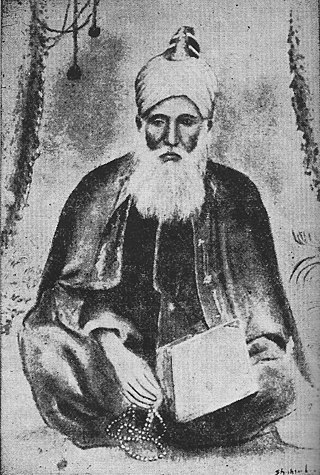
Sayyid Sāhib Ḥusayni was a famous Sufi saint from Hyderabad State, India and had a great influence over spiritual developments in the Deccan area. He belonged to Qadiri Order, and was a great proponent of the concept of Wahdat al-Shuhood.
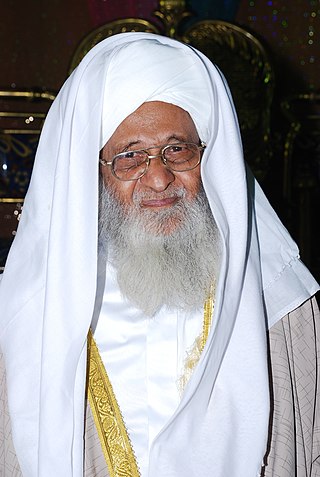
MaulanaAbdullah Quraishi Al-Azhari was an Islamic scholar from Hyderabad, India. He served as the khateeb and imam of the Mecca Masjid in Hyderabad and the vice chancellor of Jamia Nizamia University.
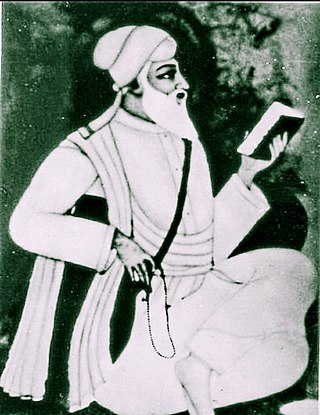
Hashim Peer Dastagir was an Indian Sufi saint belonging to the Qadri Shattari order. His shrine is in Bijapur, Karnataka, India.

Syed Ahmed Quadri was an administrator, educator, and senior officer in the government of the Nizam of Hyderabad and later on in the government of India and the UNO.

Government City College(ప్రభుత్వ సిటీ కళాశాల) (Autonomous),Hyderabad is an Under Graduate and Post-Graduate autonomous college located in Hyderabad. The campus is one of the oldest Heritage structures in Hyderabad. Government City College has been re-accredited with 'B++' grade by National Assessment and Accreditation Council. It has been conferred with autonomy by the University Grants Commission, Osmania University and the Telangana State Government since 2004. The college has adopted CBCS since the academic year 2014–15. It celebrated its centenary celebrations with cultural programmes on 25, 26 and 27 August 2022.
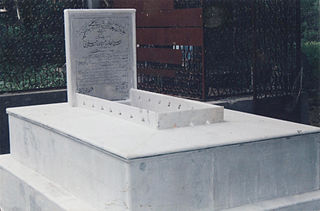
Syed Sultan Mahmoodullah Shah Hussaini, also known as "Shah ji", was a renowned Muslim Sufi, saint and scholar of the Quadri, Chisti order from the Indian subcontinent. He was the native of Kurnool. His most famous disciple and spiritual successor was Machiliwale Shah, who in turn became the spiritual master of India's noted Sufi saint.
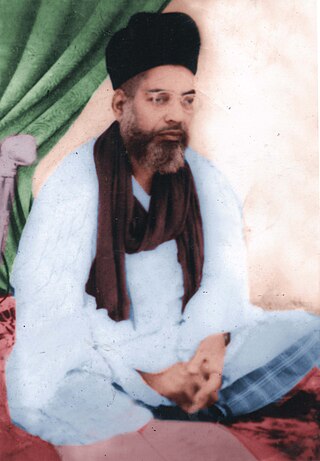
Ghousi Shah was a Muslim Sufi saint and poet from the Indian subcontinent. He was born on 1 July 1893 CE in Hyderabad, corresponding to 16 Dhulhijja 1310 AH.
Syed Shah Murshed Ali Al-Quadri Al-Jilani, commonly known as Maula Pak and Huzur Purnoor, was an Indian Sufi saint of the Quaderia order in Bengal. He was the 19th direct descendant of Abdul Qadir Jilani.

Syed Ali Aslam Jafri was a Pakistani jurist, professor of law, social worker, Justice of the Sindh High Court, Federal Ombudsman for Insurance, Director General of Sindh Judicial academy and principal of Sindh Muslim Law College.
Ghulam Mohammed was an Indian judge. He served as judge of the Hyderabad High Court between 1999 and 2012, serving as acting chief justice in 2011. He died at the age of 67.
References
- 1 2 3 "ssmqj". tshc.gov.in. Retrieved 2021-04-09.
- ↑ Thiruvananthapuram, R. KRISHNAKUMAR in (8 May 1998). "Requiem for a scandal". Frontline. Retrieved 2021-04-09.
- ↑ "Judge who wrote death for Rajiv killers urges Sonia to show magnanimity". The Asian Age. 2017-11-16. Retrieved 2021-04-09.